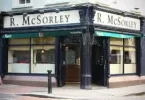IHF Calls for Government clarity on training
As part of a national action plan for hospitality craft-training, he urged the Government to mandate SOLAS to work with the sector to ensure a sustainable supply of trained workers to fill entry level positions.
Fáilte Ireland’s exit from craft training (FETAC levels 3 & 4) comes at a time when the Government has committed itself to supporting the creation of 15,000 additional tourism jobs by 2015 on top of the 180,000 people already employed in the sector. Meanwhile, hospitality businesses such as hotels, guesthouses, restaurants, pubs and bars need to replace over 3,000 craft-level workers each year due to natural attrition.
Michael Vaughan stated, “We’re facing a skills gap for businesses looking to attract people with the right training. For example, smaller hotels wouldn’t have the facilities to train someone who has no experience working in a busy kitchen.
“Ireland is renowned the world over for its excellent hospitality product,” he continued, “This didn’t come about by accident and tourism won’t have a healthy future unless we make the right training available for workers starting out in the industry. No one is providing this at the moment and hoteliers are already starting to feel the strain.”
The IHF President called for swift intervention by the Minister for Education and Skills Ruairí Quinn and the Minister for Jobs, Enterprise and Innovation Richard Bruton to provide clarity on how future training requirements for the sector will be met. He pointed out that with almost 440,000 people on the live register the overriding objective must be job-creation, getting people into the workforce and giving them an opportunity to develop their skills base and careers.
Such a plan would involve minimal capital expenditure by utilising existing resources. Examples include hotels across the country that have acted as local training facilities during off-peak periods in the past. For larger urban areas, other facilities are available nationally such as the hospitality training centre that was, up until recently, operated by Fáilte Ireland in the Limerick Enterprise Development Partnership’s campus.
“Tourism has enormous potential for job creation, with craft level training offering a valuable conduit to employment for young adults disadvantaged by the current jobs market,” stated Michael Vaughan, “For many young people, the tourism and hospitality industry is their first work experience and a valuable stepping stone in their careers.”








